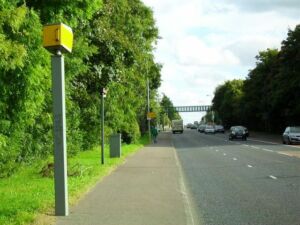News
Traffic cameras effective at slowing down Danes
This article is more than 10 years old.
Increased traffic enforcement leads to record low for average speeds

Speeds on rural roads have fallen the most (photo: Dean Molyneaux)
Danish motorists have eased their foot off the accelerator as the risk of getting a speeding ticket has increased.
New figures from the Danish Road Directorate reveal average speeds to be at a record low for the months of February, March and April.
The decrease is due in part to a government road safety package, which raised the number of traffic cameras from 25 to 100.
Speed Campaigns may also be the cause
“The development is certainly positive for road safety,” Kasper Rosenstand, the head of the Road Directorate, told Jyllands Posten.
“There is evidence of a correlation between the drop of the average speed and the increase in police speed control. It is difficult to pinpoint traffic cameras being the sole cause of this decrease, but we can clearly see that the rate has declined since more traffic cameras were installed on the roads.”
Rosenstand asserts that an increase in comprehensive speed campaigns may also be a possible reason for the decline.
Lower speed on rural roads
Speeds have fallen the most on rural roads. In Jutland, the average speed dropped 1.5km/h from February to April, while it dropped an average of one km/h across the rest of Denmark.
At the same time, the proportion of drivers speeding on roads with a limit of 80 km/h fell to 28 percent – compared to 33 percent in 2014.
According to the Danish Road Directorate, speed accounts for approximately 40 percent of fatal car accidents in Denmark.
Socialdemokraterne assert that the new figures are positive, while Venstre believes that these figures are not enough to conclude that traffic safety has improved.










































